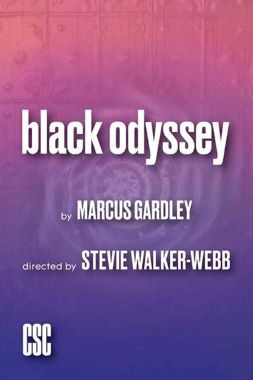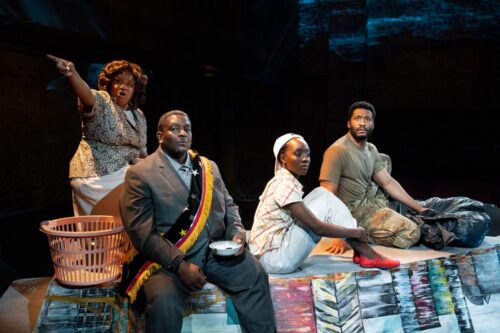THE JOURNEY OF A THOUSAND MILES BEGINS
WITH THE JOURNEY OF A THOUSAND MILES
In black odyssey written by Marcus Gardley and currently running at Classic Stage Company, Mr. Gardley steps again into his creative sandbox of African American history, Americana, mythology, heightened language and magical realism. As with his previous work, …And Jesus Moonwalks the Mississippi the Obie Award-winning playwright’s current effort seamlessly shifts between comedy and drama, microcosm and macrocosm, fantasy and reality — creating a theatrical story that is linear yet amorphous enough to allow every audience member to probably see a slightly different version. Buoyed by an excellent cast and the always inventive and precise direction of Stevie Walker-Webb, this riveting performance achieves as much size, sweep and scope as Homer’s The Odyssey — the epic Greek poem that this epic Black production takes as its starting point.
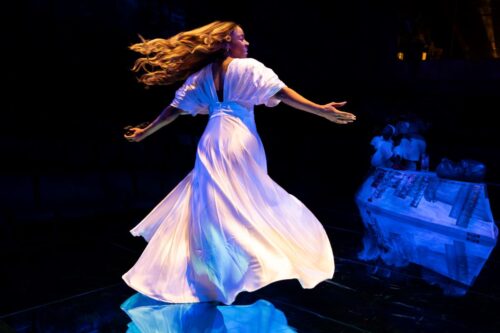
D. Woods; Harriett D. Foy and Jimonn Cole
Iraq war veteran Ulysses Lincoln (a handsome and impressive Sean Boyce Johnson) has wandered the world since leaving Iraq sixteen years prior, trying to find his way back to his young wife and son who live in Harlem. But he no longer knows who he is due to war trauma (and, born an orphan, perhaps he never knew) so he aimlessly wanders the globe on an epic mission due to his “nostos” or desire for homecoming. However, the gods are making his homecoming even more difficult as Deus (a regal James T. Alfred) and Paw Sidin (a powerful Jimonn Cole) are literally fighting over Ulysses’ life, as Paw Sidin believes Ulysses is responsible for the death of his son and wants to kill him as revenge. Also, Deus’ daughter, the goddess Aunt Tee (a magnificent Harriet D. Foy), wants to go to earth and protect Ulysses’ wife Nella (a heart-breaking D. Woods) and son Malachai (a charming Marcus Gladney Jr.). She worries they are losing hope that one day Ulysses will return to them alive. On his journey home, Ulysses has run-ins with bewitching sea sirens, a beloved ancestor, NYPD, a musical group composed of Tina Turner, Diana Ross and James Brown, and many other characters bought to life by the phenomenally versatile talents of Adrienne C. Moore, Temidayo Amay and Lance Coadie Williams. Like the original poem, Gardley’s adaptation looks at the warrior returning home from fighting and his re-entry into family and society. But Gardley also poses the questions: can an African American warrior really return home? Where is home if one has no direct knowledge of one’s cultural origins? What is the point of leaving the U.S. to go fight its enemies abroad only to return “home” and be the enemy the U.S. is fighting (and demonizing) on its own soil?
Adrienne C. Moore, Lance Coadie Williams, Tẹmídayọ Amay, and Sean Boyce Johnson; The Company
Gardely opens his show with a literal game of human chess between Deus and Paw Siden, which sets up the action to come. It’s a fitting metaphor for Gardley’s opus as the play simultaneously operates on multiple levels, as if the writer is playing 3D chess with his words. While we start with the man Ulysses, almost without realizing it, this Ulysses shifts into an avatar for the Black man and, by extension, Black people in America. And then, just as easily, he shifts back to the man again. In Gardley’s hands, Homer’s classic tale becomes just the frame from which this very African American adaptation hangs, as the playwright imaginatively remixes The Odyssey’s main plot points to better serve his vision.
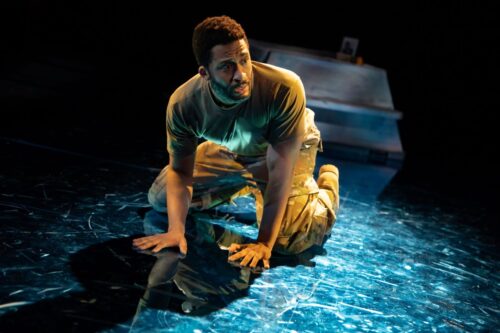
Sean Boyce Johnson; The Company
In one of many moving scenes, Ulysses Lincoln finds himself transported back to 1968 and washes up on the roof of a house in a flooded Louisiana. Also on the roof are Artez and Alesandra Sabine (Williams and Moore, respectively) and their tween daughter Benevolence (Amay). The Lord has been crying in the skies for forty days due the mistreatment of Black people, hence the flooding. When Ulysses notices people also stranded on other roofs, Moore delivers a brilliant monologue that identifies them not just as unfortunate neighbors but also key people in the struggle for equality who are still awaiting their due. The scene is at first very entertaining and maintains the kernel of Homer’s work for inspiration, specifically when Odysseus meets Phaeacian royalty. Yet Gardley also simultaneously packs an unexpected, devastating, modern day punch into this sequence, artfully expanding it from a family in crisis to a meta comment on American history. It’s an effective structural dynamic that is repeated throughout this often surprisingly funny show.
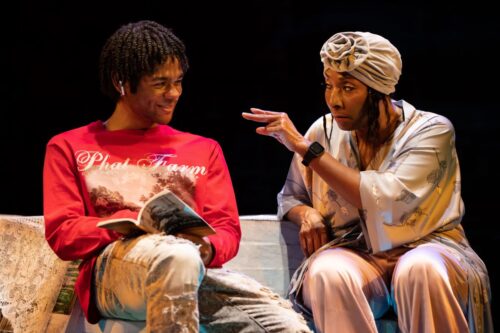
Marcus Gladney Jr. and Harriett D. Foy; James T. Alfred
The minimalist set by David Goldstein, lush costuming by Kindall Almond and malleable lighting by Adam Honore allow the production to go to any character or character-world required. Ayinde Webb underscores the piece with his onstage African drumming, adding a rhythmic texture to the overall atmosphere. Yet even with the beauty of the writing, performances and direction, there are moments when the storytelling gets confusing and the text could be trimmed. But perhaps that’s the point. In a Homeric battle for one’s humanity, clarity and brevity may need to become casualties of war.
Sean Boyce Johnson and D. Woods
The soldier returning home in triumph is a trope that permeates our society. In black odyssey by Marcus Gardley, the playwright exposes some epic fails in that mythology by inventing some epic mythology of his own. But is it an invention or long overdue recognition of Herculean effort? In the guise of Ulysses Lincoln, Gardley seems to be illustrating that, for Black people, survival in America is often a struggle. And an Epic one at that.
Harriett D. Foy
photo by Julieta Cervantes
black odyssey
Classic Stage Company, 136 E 13th St
ends on March 26, 2023
for tickets (starting at $70), visit CSC
